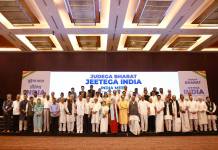The Syrian military has continued its bombardment in the country’s Eastern Ghouta enclave, where more than 600 civilians including many children have already been killed so far.
The Syrian armed forces have ignored the call from the United Nations to spare women and children from the ‘collective punishment of civilians’ adding that the military’s action was ‘simply unacceptable.’
The images of orphaned children have gone viral across the world, but this does not appear to have any impact on the conscience of the country’s despot, Bashar al-Assad. The dictatorial regime of al-Assad has refused to allow 40 trucks carrying humanitarian supplies to enter the key town of Douma. UK-based Syrian Observatory for Human Rights monitors said that the government forces had captured 25% of the area.
“Instead of a much-needed reprieve, we continue to see more fighting, more death, and more disturbing reports of hunger and hospitals being bombed,” UN regional humanitarian co-ordinator Panos Moumtzis was quoted by BBC.
Meanwhile, local residents have continued to flee from the war zone in the wake of the bombardment of Beit Sawa, south of Douma and on the eastern edge of the densely populated centre of the Eastern Ghouta. The Syrian government forces are being backed by Russia to pound civilian population with unprecedented bombing. Eastern Ghouta, according to Al-Jazeera English, has been under siege since 2013 and is the last remaining rebel stronghold near the capital, Damascus.
How it all started?
The Arab Uprising of 2011 had influenced even the Syrian people, who were fed up with the government over high unemployment, widespread corruption, a lack of political freedom and state repression under al-Assad. Al-Assad, who succeeded his military dictator father, Hafez al-Assad in 2000, has been accused of running an inept but brutal regime ignoring the interests of the population at large.
The genesis of an organised unrest in Syria dates back to the Spring of 2011, when pro-democracy demonstrations came to streets in the southern city of Deraa. Al-Assad’s forces resorted to military crackdown using deadly force to crush the dissent of unarmed civilians. But, far from containing the dissent, the government’s action led to more chaos resulting in nationwide protests demanding the President’s resignation. The civilian population was then forced to take up arms in the face of the government forces intensifying their crackdown. The decision to take up arms was primarily for two reasons, first to defend themselves and then later push the government forces out of their areas.
Al-Assad accused the protesters of being ‘foreign-backed terrorists’ and vowed to ‘crush’ them to restore state control. Foreign powers such as Russia, United States, Saudi Arabia and Iran too played their role in escalating the civil war in Syria.
Iran has been a traditional ally of Syria because of the ideological similarities of both the regimes. The Shia Iran has been spending billions of dollars annually to bolster Syria’s Shia-dominated government. A report by BBC said that Iran had been providing military advisers and subsidised weapons, as well as lines of credit and oil transfers. It is also widely reported to have deployed hundreds of combat troops in Syria.
Saudi was accused of arming the country’s Sunni majority against al-Assad’s Shia Alawite sect. The international fraternity was long criticised for turning a blind eye to the unrest in Syria. The apathy shown by the global powers was in sharp contrast to their swift intervention in other strife-torn countries such as Iraq and Libya- two oil-rich nations.
Soon, what began as a movement in favour of establishing democracy turned into a full-blown sectarian war. This also provided conducive atmosphere for terrorist outfits to cash in on the sectarian divisions in the Syrian society. Al-Assad, who felt isolated in the midst of growing protests by pro-democracy movement used the presence of terrorist outfits to his advantage in order to persuade international powers to act against them.
In September 2015, Russian military intervened and launched its air strikes in the guise of stabilising the Syrian government. Russia said that its targets were only ‘terrorists’ but activists and local media often exposed Moscow’s claims highlighting how its forces were killing civilians. Al-Assad’s survival is critical for Russian President Vladimir Putin to maintain its interests in Syria.
It was because of the Russian military offensive that the Syrian government was able to free the rebel-held eastern Aleppo in late 2016. Aside from air-strikes, Russian special forces and mercenaries too had helped break the long-running IS siege of Deir al-Zour in September 2017.
Why are Syria, Iran and Russia against democracy?
Syria is a Sunni-majority country. Giving in to the demands of pro-democracy movement would mean holding elections. A free and fair elections will inevitably result in the election of a Sunni leader of the new government thereby bringing an end to Shia Iran’s influence in Syria. Removal of al-Assad will also end Russian dominance in the country, where Moscow wants to have its presence to continue to wield influence in the middle-east.
As much as 87% of the Syrian population follows Islam. Of them a whopping 75% of them are Sunnis, while 12% are the followers of Shia sect of Islam.

















